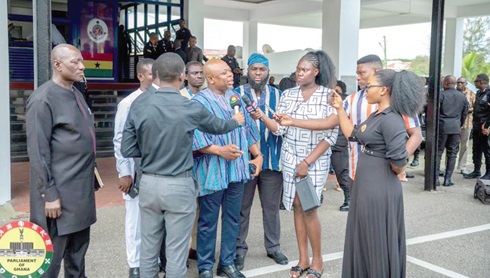The Parliamentary Select Committee on Defence and Interior has warned that the Ghana Police Service’s inadequate logistics can erode the recent gains made in the fight against crime and internal security threats.
The committee said in spite of notable progress by the police, their visibility and operational effectiveness remained limited due to a shortage of vehicles, motorbikes and other essential tools needed to respond swiftly and maintain public order.
“If the state intervenes, they can become more efficient and effective in terms of their delivery on their constitutional mandate to protect the country and to be seen as the foremost security when it comes to internal security arrangements,” the Chairman of the Committee and Member of Parliament (MP) for Builsa North, James Agalga, told journalists.
He was addressing the media last Thursday (July 17) after leading the committee on a working visit to the headquarters of the Ghana Police Service in Accra.
The engagement was part of the committee’s oversight responsibilities.
Engagement
During a closed-door session, the police administration made a comprehensive presentation on its operations, highlighting achievements in crime reduction and contributions to the national fight against illegal mining (galamsey).
However, they also outlined critical resource gaps that continued to hamper their efficiency.
Logistics
Mr Agalga disclosed that a key issue raised was the need for greater police presence in communities — something the current logistical situation made difficult to achieve.
“They need to be more visible. And how can they be more visible? They would have to be provided with more vehicles, pick-ups, more motorbikes,” he said.
He explained that while the police had some logistics, the current numbers were insufficient to maintain an active presence nationwide, especially in underserved or remote communities.
The chairman assured that the committee would push for increased funding and support for the police through parliamentary advocacy and engagement with the relevant ministries.
“We felt that there is a need for us to assist the police in terms of the advocacy we do in Parliament to ensure that some of the critical requirements are provided for them to deliver more effectively,” he said.
Ablekuma North, image
On the recent controversy surrounding the Ablekuma North partial parliamentary rerun, Mr Agalga said the matter would be fully addressed during a special session in Parliament, and that would involve the Minister for the Interior, the police administration and other security stakeholders.
“We touched on it briefly, and we all agreed that because we have a special session tomorrow at the level of the committee, we would rather tackle other issues here,” he said.
Responding to a question on whether the police have a public image problem, especially with road users, the Busila North legislator responded: “First of all, I don't accept the fact that the police has an image problem.
That can be a subjective assessment of the performance of the police service.
So, I will distance myself from responding to that question.
“What is most important is that we spoke about visibility and the need to enhance it.
The committee has given its undertaking that will support the police in that regard,” he said.

